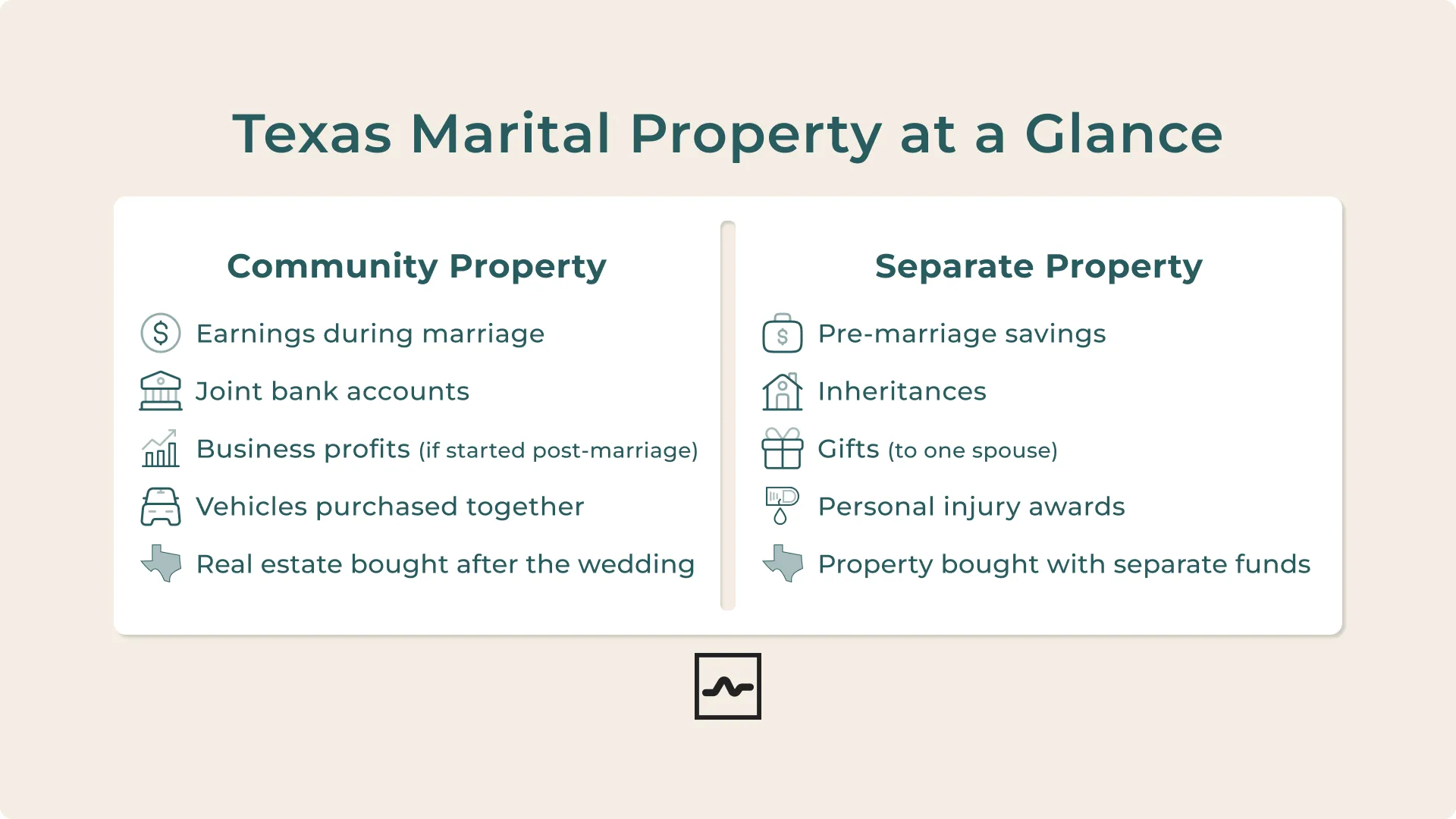When you're married, the line between “yours” and “ours” becomes legally significant, affecting everything from daily financial decisions to major life events like divorce or death. This distinction between community and separate property influences divorce settlements or orders, estate planning, and even your ability to make certain financial decisions during marriage.
As San Antonio property division attorneys with extensive expertise in both divorce cases and prenuptial & postnuptial agreements, we've guided countless clients through these decisions. Our deep knowledge of Texas property laws helps clients understand their rights and protect their interests, whether they're planning ahead or facing current legal challenges.
What Is Community Property?

Community property refers to all assets and debts acquired by either spouse during the marriage. These assets and debts are owned by both spouses, regardless of who earned or purchased them. As stated in the Texas State Law Library, community property belongs to both spouses in equal shares, creating a joint ownership interest in all marital assets.
It is presumed in Texas that all assets acquired during the marriage are community property. During divorce proceedings, community assets are divided in a just and fair manner. The law does not require an exact 50/50 division, but typically the estate will be divided more or less equally between spouses.
Common examples of community property in Texas include:
- Paychecks earned by either spouse during marriage
- Real estate purchased during the marriage
- Joint bank accounts and savings
- Retirement contributions made during marriage
- Business income generated during marriage
- Vehicles purchased with marital funds
This community ownership applies regardless of whose name appears on the title or account, and regardless of which spouse physically earned the money. The law presumes that marriage creates a partnership where both spouses contribute to the family's financial success, whether through direct income or other valuable contributions like homemaking and childcare.
What Is Separate Property?
Separate property consists of assets owned by one spouse before marriage, or property acquired during marriage through gift or inheritance specifically to that individual spouse. Recovery from personal injury may also be classified as separate property. Assets purchased with separate property are characterized as separate property, but require tracing to establish their separate character.
Unlike community property, separate assets remain under the sole ownership and control of the spouse who owns them, provided they maintain their separate character throughout the marriage.
Examples of separate property under Texas law include:
- Real estate owned before marriage
- Inheritance
- Personal injury settlement awards
- Gifts received individually (not to both spouses)
- Property purchased with separate funds
- Income generated from separate property investments
Separate property remains individually owned unless specific actions change its status through a legal process called transmutation. However, maintaining the separate nature of these assets requires careful handling and documentation throughout the marriage.
Key Differences Between Community and Separate Property

The distinction between community and separate property creates significant legal and financial differences that affect married couples throughout their relationship and beyond. These differences become significant during major life events like divorce, death, or major financial decisions.
Ownership Rights and Control
Community property is owned jointly by both spouses, meaning generally that neither spouse should sell, transfer, or dispose of community assets without the other's consent in most cases. Spouses owe each other a fiduciary duty with respect to community property, meaning that they must handle financial decisions in a fair and transparent manner with respect to their spouse.
Separate property remains under the exclusive control of the owning spouse, who can make independent decisions about buying, selling, or transferring these assets.
Division During Divorce
Community property is divided in a “just and fair” manner. The law does not require a perfectly equal division between spouses and many factors can impact the division, including:
- Bad acts during the marriage, such as adultery or cruel treatment
- The ability of each spouse to earn income
- Debts that a spouse will assume
- Disability of a spouse or a child
- Custody of children
- The length of the marriage
- Tax consequences of the division
- The nature of the property involved in the division
- The size of a spouse’s separate estate
In many cases, spouses are able to negotiate a division of their assets and debts without needing a trial, and the judge will honor that agreement and make it an order of the court. If parties are unable to agree, the division of property is determined by the judge.
Separate property is not subject to division and remains with the original owner, though proving separate property status requires “clear and convincing” evidence.

Creditor Protection
Creditors can generally reach community property to satisfy debts incurred by either spouse during marriage, regardless of which spouse created the debt. Separate property typically offers better protection from the other spouse's creditors, though exceptions exist for certain types of debts like taxes or family support obligations.
Important note: These protections vary significantly based on the type of debt and when it was incurred, making professional guidance valuable for asset protection.
Side-by-Side Comparison
The fundamental differences become clearer when viewed in direct comparison:
The main difference lies in the fundamental nature of ownership: community property creates shared ownership and shared responsibility, while separate property maintains individual ownership and control. This distinction affects virtually every financial decision and legal outcome throughout marriage and beyond.
How Separate Property Becomes Community Property
Commingling can occur unintentionally through careless mixing of separate and community assets. For example, a spouse may own a home prior to marriage. If the spouse sells the home and puts the proceeds into a joint account that also includes community funds, they have commingled separate and community property. Sometimes a forensic accountant is required to “trace” a commingled account, following special rules like “community out first” to establish which funds are separate. If no tracing is done, or if tracing is not possible, the asset will be presumed community.
Income from separate property is characterized as community property, so merely keeping a separate account for income and expenses on a separate asset may not be sufficient to avoid commingling.
Transmutation from separate to community property occurs when separate assets lose their distinct character through mixing with community property or through the owner's actions that demonstrate intent to share ownership. This can happen through adding a spouse's name to separate property titles, for example. If property purchased with separate funds is titled jointly, there is a rebuttable presumption that half of the property is a gift.
Examples of common transmutation scenarios:
- Depositing inheritance into a joint checking account
- Using pre-marital savings to renovate the family home
- Adding spouse's name to a pre-marriage vehicle title
- Adding spouse’s name to deed on a pre-marital home
- Mixing separate business income with community funds
Estate Planning Implications
Property classification significantly impacts how assets pass to beneficiaries and the tax consequences for surviving family members. Community property receives favorable tax treatment under federal law, with both halves of community assets receiving a stepped-up basis to fair market value at the first spouse's death. This means the surviving spouse can sell community property without paying capital gains taxes on appreciation that occurred during the marriage.
Separate property receives a stepped-up basis only for the deceased spouse's portion, potentially creating tax liability for the survivor if the property is sold. Additionally, separate property may be subject to different inheritance rules, particularly if the deceased spouse dies without a will. In Texas, community property automatically belongs to the surviving spouse, while separate property may be divided between the surviving spouse and other heirs according to state intestacy laws.
The distinction also affects estate planning strategies like trusts, charitable giving, and tax minimization techniques. Married couples may benefit from implementing certain strategies before death to maximize tax advantages, though these decisions require careful analysis of the overall financial picture and family circumstances, in consultation with a tax professional.
Protecting Your Property Rights
Safeguarding your property interests requires proactive planning and careful attention to how you handle assets throughout your marriage. The key lies in understanding how everyday financial decisions can affect property classification and taking steps to maintain the separate or community nature of assets according to your intentions.
Strategies for maintaining separate property status:
- Maintain detailed records of property sources and transactions.
- Avoid using separate funds for community property improvements.
- Keep inheritance and gift documentation organized and accessible.
- Consider formal agreements if you need to mix separate and community funds temporarily.
Methods for protecting community property interests:
- Document both spouses' contributions to major purchases and improvements.
- Maintain records of community funds used for separate property maintenance.
- Keep detailed financial records during marriage.
- Review and update estate planning documents regularly.
- Consider postnuptial agreements to clarify property intentions.
Professional guidance becomes particularly valuable when dealing with business ownership, real estate investments, or significant separate property that generates income during marriage. Income from separate property is characterized as community property, so merely keeping a separate account for income and expenses on a separate asset may not be sufficient to avoid commingling. Early consultation can prevent costly mistakes and protect your long-term financial interests.

Understanding Your Property Rights: Take Action Today
The difference between community and separate property affects virtually every aspect of married life, from daily financial decisions to major life transitions like divorce or death. Understanding these distinctions empowers you to make informed decisions about asset protection, estate planning, and financial strategy throughout your marriage.
With our ample experience in family law, Lishman Law provides comprehensive services for both married couples planning ahead and individuals facing divorce proceedings. Our expert knowledge and skills with Texas property laws and property division help clients protect their interests and achieve their goals. Contact us today to discuss your specific situation and learn how we can help you understand and protect your property rights.

Lishman Law family attorneys understand the intricacies of property classification and help clients make informed decisions about asset protection. Whether you're planning ahead or dealing with current property disputes, we provide the guidance you need to protect your interests.






.avif)




